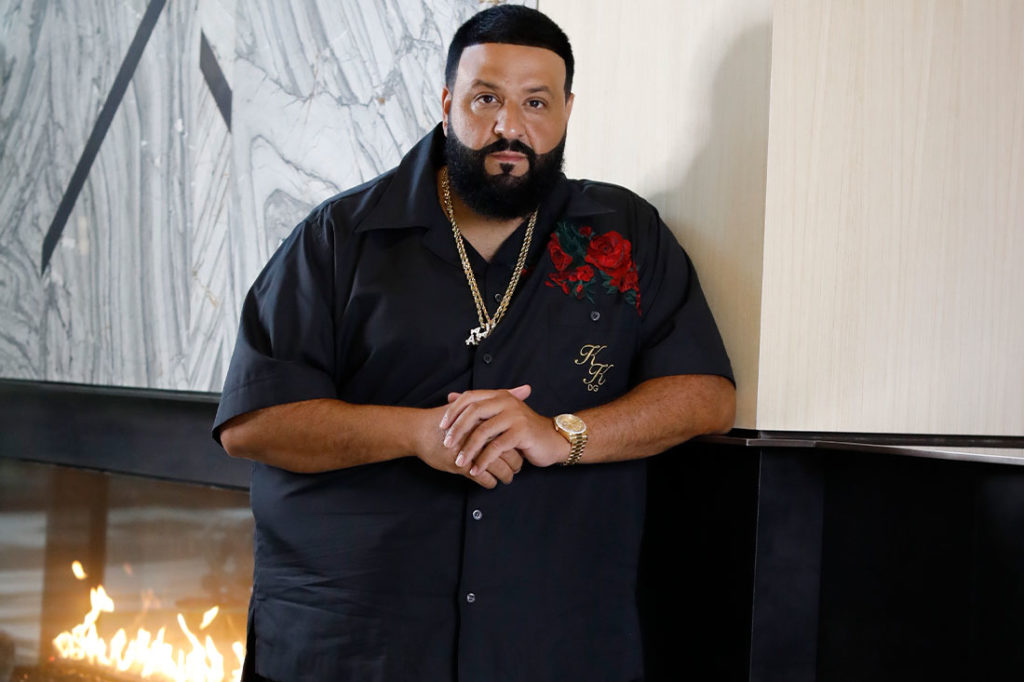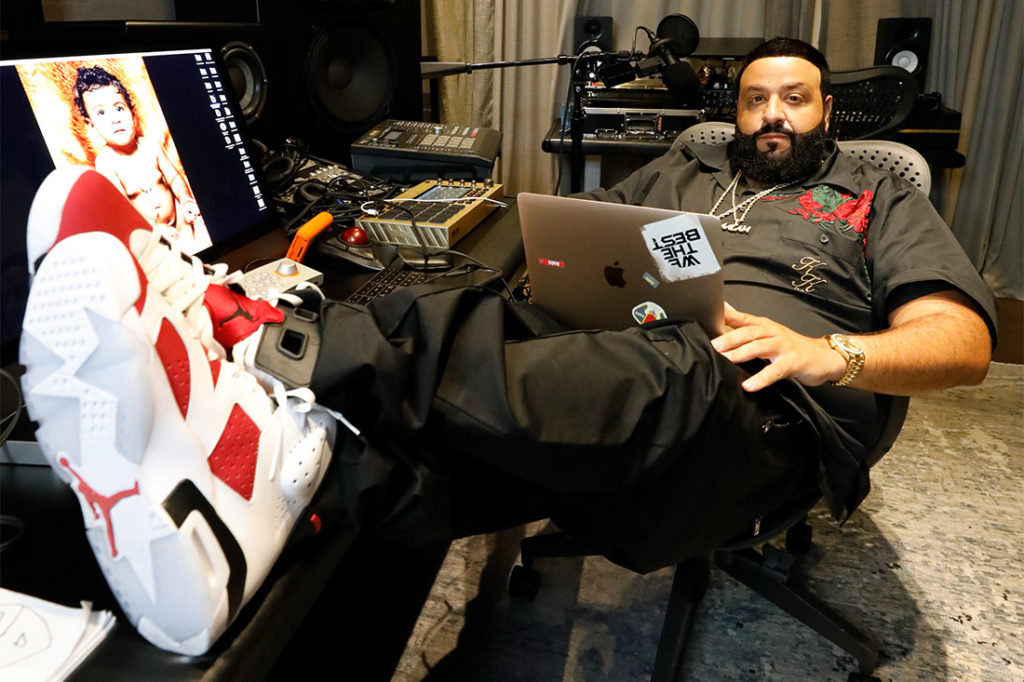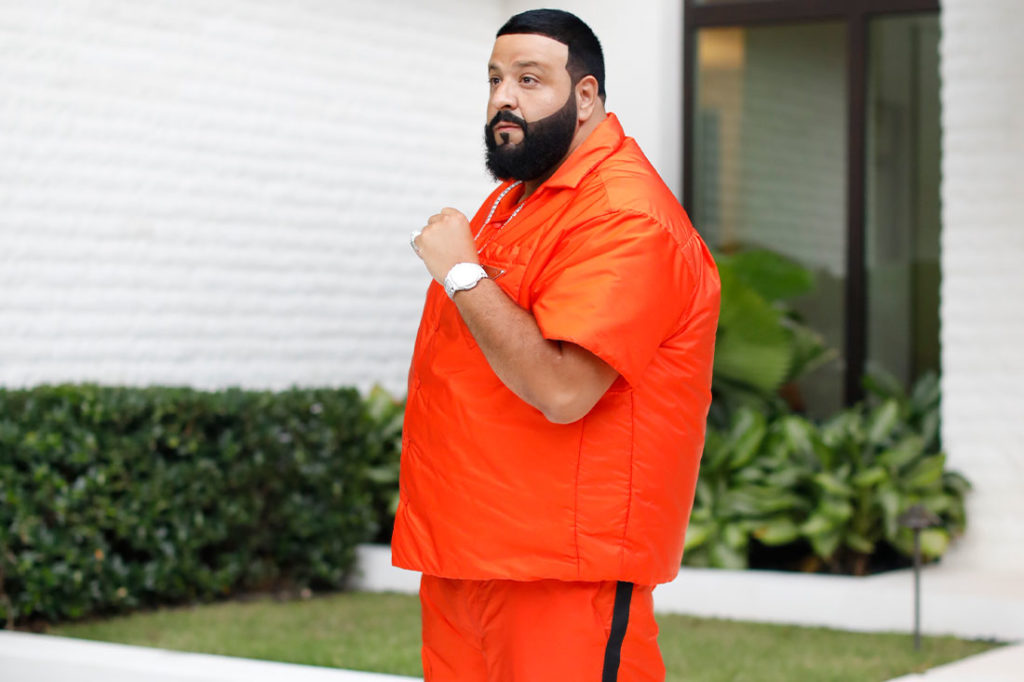Eighteen minutes and 17 seconds into DJ Khaled’s Zoom interview with SUCCESS, his voice was briefly drowned out by what sounded like the unmistakable roar of a lion. I’d be lying if I told you it didn’t startle me. Was it actually a phone notification plugged into a loudspeaker? A motorcycle whizzing past? An antique clock just out of frame with a lion instead of a cuckoo bird?
Was it… an actual lion?
You might think any of these possibilities would reasonably warrant a brief pause or explanation. But the music mogul just kept talking right through it about the topic at hand: social media.
“…If you use social media on a negative level, that’s not good,” Khaled says as the roar dies down. “I’m not for that.”
To millions and millions of people who follow DJ Khaled on various social media platforms, particularly Snapchat, lions are one of the many things, real and metaphorical, that he’s made part of his persona. He has a stone lion statue in his garden, and his regular followers—at one point, over 3 million people viewed each one of his Snapchats—would see him walk by it and yell “LION!” frequently.
DJ Khaled, full name Khaled Mohammed Khaled, is a record executive, DJ, New York Times best-selling author, and producer who has released 12 albums under his name, three of which debuted at No. 1 on the Billboard charts. But as much as anything—or perhaps the prevailing quality behind those things—he is something of a life coach. He might not explicitly advertise himself as such, but if you deny that he’d be qualified to do so, that might just say something about how you look at personal development, hip-hop and what motivating people is allowed to look like in order to still be considered betterment.
See, Khaled’s success on a platform like Snapchat doesn’t come down to him showing all of himself on the app (though he certainly gives his followers a healthy dose of funny, absurd, inspirational, indulgent or innocuous content). He mostly leaves out his children, his wife Nicole, the hard work and struggle his parents went through that mirrors the struggle of so many immigrants, and some of the past successes that his younger followers might not know or even care about. Those things, of course, make him who he is.
But the reason social media is so beneficial for Khaled is that, over time, the people who have heard his voice yelling over the beginning of some of their favorite records start to realize what all his co-collaborators and his business partners already know: None of what you’re seeing and hearing actually make up a contrived persona. His energy and optimism aren’t part of some alter ego. He is his biggest cheerleader, and he is your biggest cheerleader. When he bets on people, he usually cashes in on that bet. And he bets on a lot of people. Or perhaps he’s convincing them to bet on him. Either way, it all just keeps working out: the records, the deals, the collaborations, all of it.
So, to Khaled, the notion of a lion roaring at a startling volume isn’t even worth breaking his sentence. Maybe I should have known better, too. “Lions are the kings of the jungle, and it’s a jungle out there, so you’ve got to be king,” Khaled writes in his book The Keys, a virtual syllabus in understanding his mindset for success. “You say lion to give yourself courage and to invoke that courage in others, too.”

* * *
Dreams aren’t always safe after they come true, even if that’s usually the point where the book or the movie comes to an end. Khaled’s parents taught him how to create something from nothing when he was still a young boy. When he was a teenager, the world taught him that life isn’t fair, at the expense of those parents.
Khaled was about 16 and DJing a party in Orlando, Florida where he spent his formative years, when his phone rang. It was from the phone line inside his little makeshift studio in his parents’ house. He was typically the only one ever in that studio, and it was unusually late for his parents to be calling anyway. He picked up the phone long enough to hear his mom’s scream at the other end before the call dropped. He rushed back to the house to find police everywhere.
We must rewind a bit. The reason teenage Khaled lived in a house with an in-home studio is a testament to his parents’ hard work—their own success story. Palestinian immigrants, his parents were tailors and garment sellers. They came to the United States with skill sets and a belief they could prosper from it. They sold clothes out of the trunk of their car. They dragged a young Khaled to flea shops where they sold garments. High-end clothes are usually sold in high-end settings, not folding tables placed on concrete. There’s “fake it till you make it,” and there’s making the most of your skills no matter what. That’s what his parents did.
“My work ethic comes from my mother and my father for sure,” Khaled says. “I’d seen them work seven days a week, and they provided for their kids. They took care of us beautifully.”
The product was literally beautiful, and there was something beautiful about the spirit of selling your hard work to the community. It paid off, and demand led to growth. Word spread. They were able to open a store in a shopping center and eventually a popular mall. Local Orlando celebrities like Shaquille O’Neal were customers. Khaled used to sleep at the store when his parents felt like they had to work through the night to reach the next level.
“The most beautiful part of it was that they were raising us with so much love and still working every day,” Khaled remembers. “They were still giving time to us every day.”
The work paid off, but when Khaled pulled up to the house with lights flashing, the home had been robbed. His parents and sister were roughed up. His mother had tried to lock herself in Khaled’s studio to hide before the phone lines were cut. The most important thing was that his family survived the incident, losing only possessions and peace of mind. But they ran into financial problems in the immediate aftermath, forcing them to close the shop.
Khaled already mirrored his parents’ work ethic in his passion for music. Beginning at 13 or 14, he organized parties that brought people in. “I didn’t wait on a promoter to hire me,” he says. “We rented out a hall and charged people $2 or $5 to get in, and we made money.”
Those parties didn’t just net him a profit. They put him on display. Organizing the party was the work ethic, but the actual parties are where he showcased his refined natural abilities: playing and mixing music and talking to the crowd. The parties were the best in the city, eventually in all of Florida. By his early 20s, he established himself as a Miami radio DJ. Eventually, one of the most surefire ways for a New York musician to make a song a hit was to send it to Florida and put it in front of DJ Khaled. Soon he was releasing his own albums. When Jay-Z was less than responsive about being featured on one of his albums, he moved his family to New York so that he could make a full-time job out of persuading the rapper to record a verse for him. Eventually Jay-Z relented. He recorded a verse for Khaled’s next album as well, and also became Khaled’s manager.
By any definition he’d reached undeniable success in music by 2008, and he seemed to have a reasonable blueprint to sustain it. But his parents had reached success in their field, too. And it was taken away from them. Maybe that scared DJ Khaled, or maybe he just assumed his relentlessness could take him anywhere. Books. Endorsements. Acting. A furniture line. Podcasts.
“I wear a lot of hats,” he says. “And sometimes you find out about a new hat every day. There are no limits and there are no ceilings. You’re going to see restaurants, clothing, new products and more music.”
While initially making waves as a DJ, Khaled slept in his car. When he finally had enough for an apartment, he didn’t have any money left over to furnish it, so he slept on the floor with his head on his records. Music is his first love, but it’s only part of the personal brand he has created. Khaled’s name is the business, and there is no preset template for what to do next.
“Show me another Palestinian mogul who succeeded in hip-hop,” Khaled challenges readers in the book. “Sometimes you have to invent who you want to be.”
* * *
To the casual critic, DJ Khaled might seem like someone who just happens to be in the right room with talented people consistently. But what a lot of personal development coaches don’t tell you is how exactly to get in those rooms. For Khaled, it’s relentless positivity.
“DJ Khaled is just pure passion. I love the man. He’s just creative, and he’s so honest and so sincere,” says business and life strategist Tony Robbins, who in 2016 shared with Khaled the cover of Complex for an issue the hip-hop magazine dubbed “the most inspirational magazine ever!”
Khaled exists primarily in hip-hop, a genre and industry that has so often been fueled by competitiveness. But his entire success is based upon collaboration and bringing rappers and other musicians together.
“When everybody respects the code and moves with a clean heart, everybody thrives,” he wrote in The Keys.
Khaled has a lot of catchphrases, but his most signature is “We the Best.” When he first came upon the scene, We was interpreted as probably a faction of people he came up with or who gave him a platform, but as the collaborations turned into multitudes of artists who had never worked with each other, it became clear that We was you and me. We was everyone. Well, except for They.
They represents anyone actively or passively rooting against your growth or success. You have to do something to be They. To be We, all you have to do is simply not be They.
Things like We and They and Keys and Code and various other words that Khaled yells on his records are ultimately shorthand for things that we all know to be true. It’s possible that you don’t appreciate hip-hop enough to see it, but all these things are mantras and must be understood as such. And reading them here doesn’t do them justice, because Khaled usually yells them immediately before or after contributions by some of the most popular musicians in hip-hop, and you could certainly argue that music is more powerfully inspirational than any symposium or viral TED Talk.
“He came up with these insights and tools,” Robbins says of his friend, Khaled. “He started working with the greatest entertainers on Earth, but there’s persistence. He has an unbelievable amount of talent, but that talent is maximized because his whole life is about staying inspired and moving forward.”
What’s important to remember is that his rise in music consisted of facilitating the rise of other musicians. “Breaking an artist” is industry slang for showcasing a musician in a way that represents their big break into the public sphere. As a DJ, Khaled’s events did that. “If you had a record break in Miami, it was understood that I had a hand in it,” Khaled remembers of his earlier years.
It might feel like that notion is hard to compare to the business world, except that Khaled has had unbelievable success in that realm by applying the same mentality of community that he does to music. He’s like the physical embodiment of the most memorable LinkedIn recommendation you’ve ever read.
To him, good business is elevating people, and if They sounds vague, it’s because he doesn’t like to attach names to negativity. That’s They behavior, quite frankly. Ask him if he’s seen artists waste their talents, and he’ll start to look uncomfortable, a nearly unrecognizable look on such an affirming person.
“I’m not here to judge anyone,” he’ll say. “I’m here to tell you to keep going.”
Of course he’s seen people waste their talents. He’s been around more talent than could possibly be quantified. But what good does denigrating them do anyone?
Self-cheerleading isn’t usually considered cool, but for someone who is in the public eye, looking cool isn’t one of his goals. Because cool changes. The artists that he originally broke and the artists on his first album, with a few exceptions, have largely been replaced by younger artists who approach music differently and with different technology. You won’t find any resistance from Khaled. He wants those young people on his records. “I think it’s so critical to have a relationship with not only the people who came before you and the people you came up with but also with the people who are next,” he writes.

Snapchat, for example, has brought him countless fans who might have barely known about his older music. He doesn’t waste time trying to educate Gen Z followers on his past. He just takes them in stride. Khaled is 45. Someone had to explain to him how to use Snapchat before he became one of the platform’s biggest stars.
If you can learn anything from just watching Khaled exist in the public eye, it’s that bravado doesn’t mean ego, and false humility doesn’t mean anything if you aren’t elevating people.
* * *
Khaled isn’t slowing down because he now has what he calls an “empire,” and he’ll quickly tell you that empire is intended for his two sons, Asahd, 4, and Aalam, 1. If they want to follow in his footsteps, he intends to set up all of his enterprises for them to have an opportunity to manage. But he insists that he’ll support them no matter what they want out of life.
For all of Khaled’s major keys over the years, he would rarely provide his motivation besides vague desires for possessions he could never afford before his success. But now that motivation is crystal clear.
“I’m doing this for my kids, and before I had kids I was doing it for my kids,” he says. Khaled, Nicole and the boys graced the cover of Parents in 2020.
Making a record is extremely difficult. It takes musical skill and a degree of technical precision. Collaborating with dozens of enormously famous musicians on each album is a logistical nightmare. Most of them are signed with different record labels, so licensing and song clearances are a constant negotiation. The point is that DJ Khaled is a master of a craft. Quite a few of them, actually. That mastery was required for his success.
But he doesn’t dwell on the technical aspects of his craft like some artists, because that’s not relatable. That doesn’t help you. That doesn’t help his kids, who might have different skills. His craft was his passion and his job—that was clear since those early parties he used to DJ. But his calling is inspiration and unity.
“I think for sure people know that I work hard, but we are all talented,” he said. “We are all blessed and we are all geniuses.”
When someone accomplishes something so uniquely great, what’s really shining through to the world is the specificity of their perspective, their talent, their hard work and their approach. Genius seems inherent, but so much of what we label as “genius” only seems that way because we would never think to look at it the way they looked at it. It’s simply a vision unlocked.
DJ Khaled has the keys.
This article originally appeared in the September/October 2021 issue of SUCCESS magazine.
Photos by Ivan Berrios





